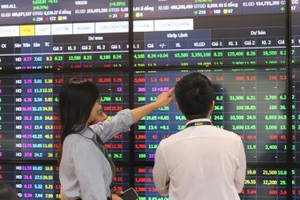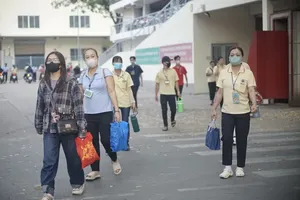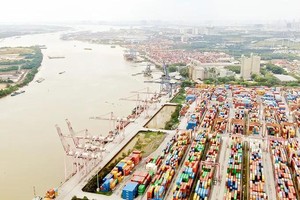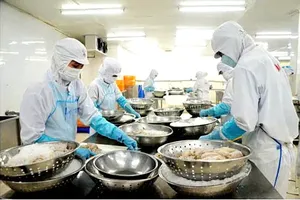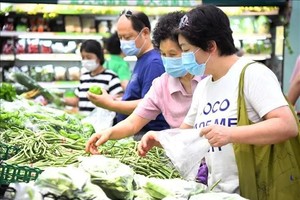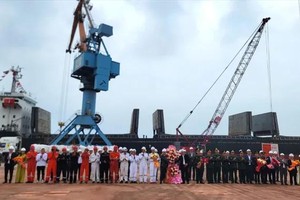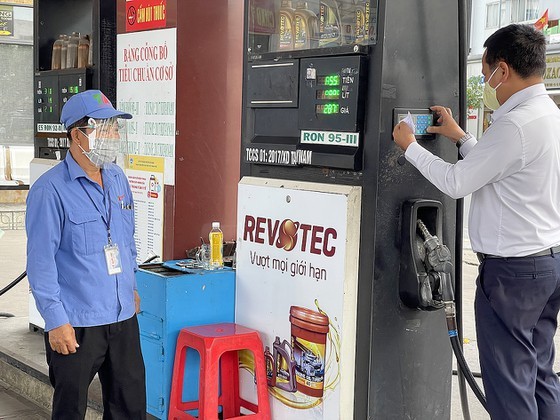 A petrol station adjusts gasoline prices on October 26. (Photo: SGGP)
A petrol station adjusts gasoline prices on October 26. (Photo: SGGP)
Reducing taxes and fees to lower petrol prices
Assoc. Prof.-Dr. Ngo Tri Long, former Deputy Director of the Institute for Price and Market Research under the Ministry of Finance, said that the sharp increase in gasoline prices would have great impacts on the costs of direct production and consumption industries, such as transportation, offshore fishing, and agriculture. At the same time, it would affect the price level, leading to the risk of inflation. In the current context, there are two ways to lower or stabilize gasoline prices. Amid the context that the Fuel Price Stabilization Fund is relatively exhausted because it has continuously spent for many months, reducing tax is the sole feasible solution.
According to Assoc. Prof.-Dr. Dinh Trong Thinh of the Academy of Finance, in the current structure of petrol price, taxes and fees account for more than 40 percent. Petrol has to carry four types of taxes, including import tax, value-added tax, excise tax, and environmental protection tax, not including corporate tax, which is carried by businesses. Of these, the environmental protection tax for each liter of gasoline is fixed at VND3,000-VND4,000 per liter, borne by consumers. If these taxes are cut along with the flexible and effective management of the Fuel Price Stabilization Fund, the rising momentum of fuel prices will be controlled.
Mr. Tran Duy Dong, Director of the Domestic Markets Department under the Ministry of Industry and Trade (MoIT), said that besides flexibly using the Fuel Price Stabilization Fund, the MoIT would report to the Government and propose some solutions. Specifically, it would suggest the Prime Minister direct the Ministry of Finance to reduce taxes and fees, including import-export tax, excise tax, and especially, environmental protection tax. To prevent the risk of fuel traders taking advantage of increasing gasoline prices, on the afternoon of October 26, the MoIT said it would coordinate with relevant agencies to inspect and supervise the responsibility of ensuring the supply of petrol and oil to the market of fuel traders and strictly handle violations if any.
People cut spending when gasoline prices advance
Explaining the reason why the world oil prices had constantly escalated, Ms. Le Viet Nga, Deputy Director of the Domestic Markets Department, said that many economies were gradually recovering after controlling the Covid-19 pandemic, so the demand for travel and production highly increased. The high global oil price is an important factor affecting the domestic petrol price and is forecasted to be unlikely to decline in the coming time.
Assoc. Prof.-Dr. Ngo Tri Long said that many people forecast that oil prices could increase to US$100 per barrel. "In my opinion, oil prices will not be able to reach $100," he said and cited that “the recent increase in oil prices is triggered by the recovery of the global economy, but this recovery is brief. The pandemic may recur and develop complicatedly in many countries. More importantly, too high world oil prices will lead to a contraction in production and a slump in demand. The Organization of the Petroleum Exporting Countries (OPEC) certainly does not want that.”
Previously, assessing the average increase in gasoline prices in the first nine months of this year, Mr. Nguyen Bich Lam, former General Director of the General Statistics Office, said that the increase in petrol prices not only inflated the cost prices of goods and services but also directly enlarged the Consumer Price Index (CPI), affecting people's income and spending. A 10-percent increase in gasoline price causes the CPI to climb by 0.36 percentage points and decrease the GDP by about 0.5 percent. This reduction has a significant impact on economic growth. Spending on petrol accounts for 1.5 percent of total household final consumption expenditure, so when gasoline prices surge, people will restructure and cut a part of their spending, curtailing the economy's aggregate demand.
Assoc. Prof.-Dr. Ngo Tri Long, former Deputy Director of the Institute for Price and Market Research under the Ministry of Finance, said that the sharp increase in gasoline prices would have great impacts on the costs of direct production and consumption industries, such as transportation, offshore fishing, and agriculture. At the same time, it would affect the price level, leading to the risk of inflation. In the current context, there are two ways to lower or stabilize gasoline prices. Amid the context that the Fuel Price Stabilization Fund is relatively exhausted because it has continuously spent for many months, reducing tax is the sole feasible solution.
According to Assoc. Prof.-Dr. Dinh Trong Thinh of the Academy of Finance, in the current structure of petrol price, taxes and fees account for more than 40 percent. Petrol has to carry four types of taxes, including import tax, value-added tax, excise tax, and environmental protection tax, not including corporate tax, which is carried by businesses. Of these, the environmental protection tax for each liter of gasoline is fixed at VND3,000-VND4,000 per liter, borne by consumers. If these taxes are cut along with the flexible and effective management of the Fuel Price Stabilization Fund, the rising momentum of fuel prices will be controlled.
Mr. Tran Duy Dong, Director of the Domestic Markets Department under the Ministry of Industry and Trade (MoIT), said that besides flexibly using the Fuel Price Stabilization Fund, the MoIT would report to the Government and propose some solutions. Specifically, it would suggest the Prime Minister direct the Ministry of Finance to reduce taxes and fees, including import-export tax, excise tax, and especially, environmental protection tax. To prevent the risk of fuel traders taking advantage of increasing gasoline prices, on the afternoon of October 26, the MoIT said it would coordinate with relevant agencies to inspect and supervise the responsibility of ensuring the supply of petrol and oil to the market of fuel traders and strictly handle violations if any.
People cut spending when gasoline prices advance
Explaining the reason why the world oil prices had constantly escalated, Ms. Le Viet Nga, Deputy Director of the Domestic Markets Department, said that many economies were gradually recovering after controlling the Covid-19 pandemic, so the demand for travel and production highly increased. The high global oil price is an important factor affecting the domestic petrol price and is forecasted to be unlikely to decline in the coming time.
Assoc. Prof.-Dr. Ngo Tri Long said that many people forecast that oil prices could increase to US$100 per barrel. "In my opinion, oil prices will not be able to reach $100," he said and cited that “the recent increase in oil prices is triggered by the recovery of the global economy, but this recovery is brief. The pandemic may recur and develop complicatedly in many countries. More importantly, too high world oil prices will lead to a contraction in production and a slump in demand. The Organization of the Petroleum Exporting Countries (OPEC) certainly does not want that.”
Previously, assessing the average increase in gasoline prices in the first nine months of this year, Mr. Nguyen Bich Lam, former General Director of the General Statistics Office, said that the increase in petrol prices not only inflated the cost prices of goods and services but also directly enlarged the Consumer Price Index (CPI), affecting people's income and spending. A 10-percent increase in gasoline price causes the CPI to climb by 0.36 percentage points and decrease the GDP by about 0.5 percent. This reduction has a significant impact on economic growth. Spending on petrol accounts for 1.5 percent of total household final consumption expenditure, so when gasoline prices surge, people will restructure and cut a part of their spending, curtailing the economy's aggregate demand.
